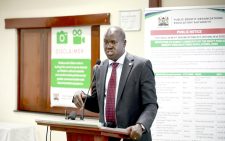Belts tightened as State rolls out austere policies

After a series of protests against the now-rejected Finance Bill 2024 over punitive taxes amid high cost of living cuts dig in
The Government has rolled out austerity measures across all ministries, departments and agencies (MDAs) meant to cut down on operational costs.
The National Development Implementation Committee (NDIC) in a meeting chaired by Prime Cabinet Secretary and Cabinet Secretary for Foreign and Diaspora Affairs Musalia Mudavadi on Thursday, July 11, 2024 all accounting officers were directed to rationalize and prioritize their activities and programmes within the available resources.
“This is after the NDIC adopted Measures proposed by the National Treasury to whittle down the recurrent budget by Sh 35.7 billion and Sh133.5 billion for the Development Budget,” reads a statement issued after the meeting in which all Principal Secretaries are members.
The meeting held at the Kenya School of Government addressed Austerity Measures, Zero Fault Audit Outstanding Issues raised by the Auditor General for all MDAs, Foreign Economic Diplomatic Visits and Summits and Revised Guidelines on the Framework for Coordination and Supervision of Government Operations.
Received reports
Also attended by Head of Public Service, Felix Koskei as the vice-chairman and Convenor, the secretariat received and deliberated on reports of the National Integrated Post Disaster Management Assessment on Floods, Budget Summary for the financial year 2024/25.
It was resolved that consequently, the 2024/25 Budget will immediately be resubmitted to the Kenya National Assembly to reflect the above for approval.
“The NDIC noted the Zero Fault Audit Report that seeks not to attract a single Audit Query from the Office of the Auditor General. The objective of the Zero Fault Report is to reinforce good governance, integrity, accountability, transparency and establishment of global best practices within MDAs by ensuring prudent utilisation and management of public resources as well as offer timely and high-quality services to Kenyans,
“Upon consideration of the above report, NDIC directed PS’s to ensure Heads of Accounts complete all financial statements by August 10 and PSs must attend Audit entry meetings to ensure reduction of wastage in public penalties, fines, and legal consequences, which take away resources from development,” the statement further reads.
Development policies
In furtherance of the NDIC’s mandate of overseeing the implementation of all National Government programmes, policies and projects, the meeting received and deliberated on Reports of the National Integrated Post Disaster Management Assessment on Floods, Budget Summary for the year 2024/25.
It was observed that the March-May 2024 floods resulted in 315 fatalities and caused damage amounting to Ksh124.15 billion across all sectors in 47 counties.
“The sub-sectors most affected were Roads – Sh37.56 billion, Cooperatives Sh20 billion, Environment and Climate Change – Sh6.98 billion and Basic Education – Sh12.94 billion. A total of 55,010 households and 410,437 persons were affected,’” it further observed.
The NDIC directed all PS’s to review the Report on Nature, Extent and Impact of Floods; share feedback with the National Government Coordination
Secretariat (NGCS) within Seven (7) days for input before being escalated to Cabinet for adoption and implementation.
While noting that all State Departments had established Corruption Prevention Committees Chaired by the Principal Secretaries in Person, NDIC directed that Each State Department commit to sensitise Staff on ethics, integrity and anti-corruption, undertake a Corruption risk assessment and mitigation plan and provide all and any relevant information and documentation to the EACC and any other agencies investigating corruption matters.
In line with the Public Private Partnership Act, 2021, NDIC resolved to relook at the Private Public Partnership Directorate with a view to analysing existing projects and how they have been processed and performing to make it effective and efficient in the delivery of services.
With regard to strategic communication in government, the Secretariat observed that there were capacity gaps and budgetary challenges hence the need for a focused approach to Communication.
“The members resolved to address this by formation of a multi-agency Team
Headed by the Office of the Prime Cabinet Secretary to look into a sustainable Whole of Government Approach solution,” the team recommended.
In its second meeting of 2024, the NDIC upheld its commitment to hold a biannual joint meeting with Cabinet Secretaries to resolve and direct action towards national development and escalate the implementation of Bottom-Up Economic Transformation Agenda priorities.










